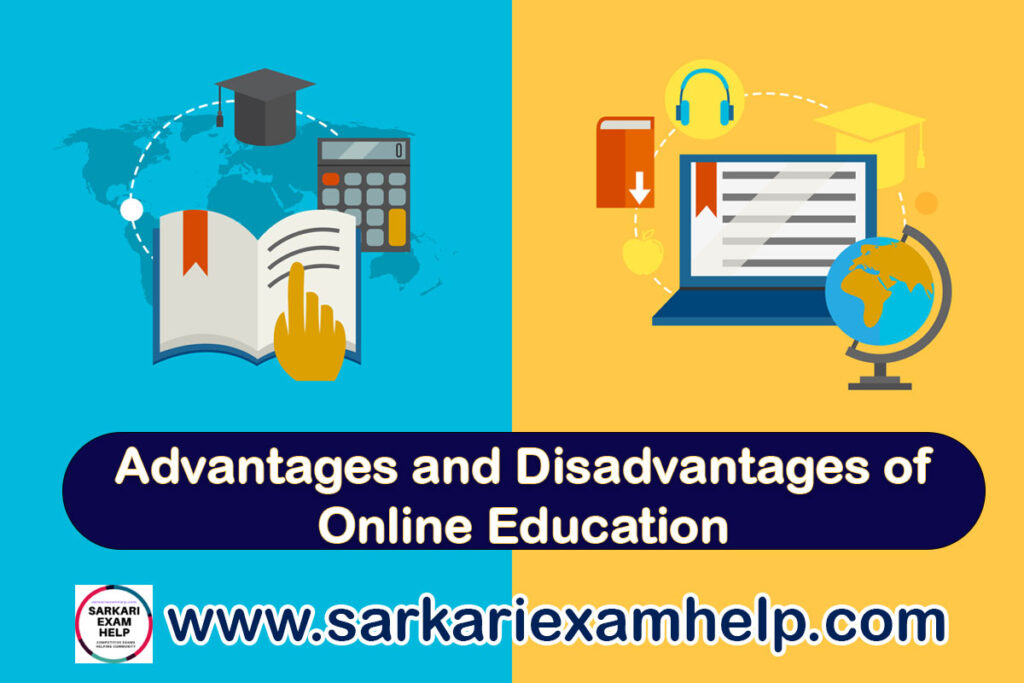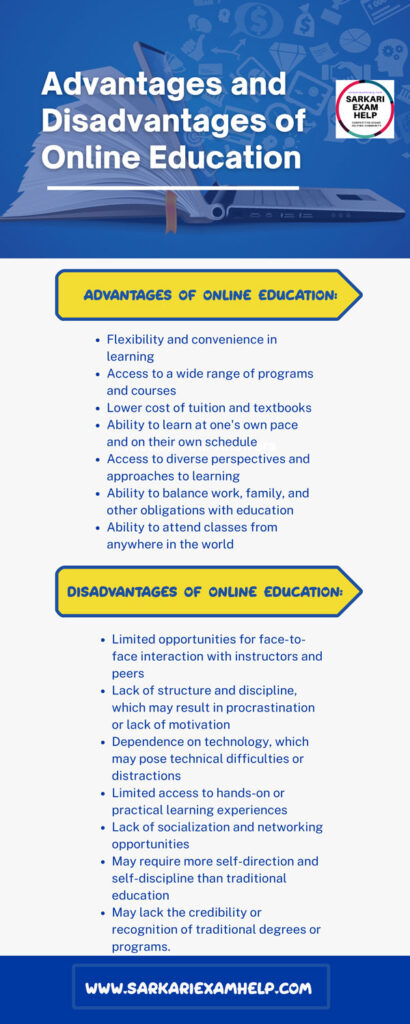Advantages and Disadvantages of Online Education: As the world continues to evolve, education is also evolving to keep up with the changing times. Thanks to technological advancements, online education has become a more popular option for students, offering flexibility and accessibility that traditional classroom learning may not provide. However, just like any other form of education, online learning has its advantages and disadvantages. In this article, we’ll take a closer look at both the benefits and drawbacks of online education, helping you make an informed decision about whether pursuing an online degree is the right choice for you.
Definition of online education

Online education is a term for a certain sort of education that takes place using the internet and various technology resources and tools. Self-paced courses, hybrid courses that blend online and in-person instruction, and totally online courses are some of the various formats this kind of education can take. As long as they have an internet connection, it allows students to access instructional materials and communicate virtually with teachers and peers at any time and from any location. Online learning has grown in popularity over time because it offers a variety of courses and programmes as well as flexibility and convenience.
Suggested Article: What is E-learning? Definition of ‘E-learning’ Explained
The Advantages of Online Education
1. Flexibility
One of the biggest advantages of online education is the flexibility it offers. Online courses allow students to study from anywhere, at any time, as long as they have an internet connection. This means that students can work and study at the same time, which is particularly beneficial for those who have other commitments such as family or work.
2. Cost-Effective
Online education is often more cost-effective than traditional, on-campus education. Since students do not have to travel to a physical location, they save on transportation costs. Additionally, online courses tend to have lower tuition fees than traditional courses.
3. Access to a Wide Range of Courses
Online education provides students with access to a wide range of courses that may not be available in their local area. This allows students to pursue their interests and passions, regardless of their location.
4. Customizable Learning Environment
Online education allows students to customize their learning environment to suit their needs. They can choose to study in a quiet, distraction-free environment or study in a busy cafe. This level of customization can help students learn more effectively.
5. Self-Paced Learning
Online courses are often self-paced, which means that students can study at their own speed. This allows students to spend more time on difficult concepts and move quickly through easier material.

The Disadvantages of Online Education
1. Lack of Social Interaction
Online education lacks the face-to-face interaction that traditional, on-campus education provides. This can lead to feelings of isolation and loneliness, which can affect a student’s overall well-being.
2. Requires Self-Motivation
Online education requires self-motivation and discipline. Students must be able to manage their time effectively and keep up with coursework without the guidance of a teacher.
3. Technology Issues
Online education relies heavily on technology, which can be unreliable at times. Technical issues such as slow internet speeds or computer malfunctions can cause frustration and hinder a student’s learning.
4. Limited Interaction with Instructors
Online courses often provide limited interaction with instructors. This can make it difficult for students to get the help they need when they are struggling with coursework.
5. Limited Hands-On Experience
Online courses often lack the hands-on experience that traditional courses provide. This can be particularly problematic for students pursuing degrees in fields that require practical experience, such as nursing or engineering.
Importance of online education
Online education has become increasingly important in today’s world for several reasons. First, it provides flexibility and convenience, which is particularly valuable for individuals with busy schedules or those who cannot attend traditional classes due to various reasons such as work, family obligations, or physical disabilities. With online education, students can access course materials, assignments, and lectures at any time and from anywhere, allowing them to learn at their own pace and on their own schedule.
Second, online education provides access to a wide range of programs and courses, many of which may not be available in traditional classroom settings. Students can choose from a variety of subjects and disciplines, and they can also select courses offered by institutions from around the world, increasing their exposure to diverse perspectives and approaches to learning.
Third, online education can be more cost-effective than traditional education, as it eliminates the need for commuting or relocating, and it often has lower tuition fees. Additionally, online education can save students money on textbooks and other materials, as many online courses offer digital versions of required readings.
Overall, online education offers a flexible, convenient, and affordable way to access high-quality education and training, which can have significant benefits for individuals and society as a whole.
Online education vs. traditional education
Online education and traditional education are two different modes of learning that have their own advantages and disadvantages.
One of the main differences between online and traditional education is the mode of instruction. In traditional education, instruction takes place in a physical classroom, with face-to-face interaction between students and instructors. In contrast, online education takes place over the internet, with instruction and communication occurring through various technological tools and resources.
Another difference between the two modes of education is the level of flexibility they offer. Traditional education often follows a fixed schedule, with classes and assignments occurring at specific times and dates. Online education, on the other hand, offers greater flexibility, allowing students to access course materials and complete assignments at their own pace and on their own schedule.
Cost is also a significant difference between online and traditional education. Traditional education often involves higher costs, including tuition fees, textbooks, and other materials. In contrast, online education can be more affordable, with lower tuition fees and often less costly textbooks.
Despite these differences, both online and traditional education have their own advantages and disadvantages. Traditional education offers the benefits of face-to-face interaction and a structured learning environment, while online education offers greater flexibility and accessibility. The choice between the two modes of education ultimately depends on individual preferences, needs, and circumstances.
Future of online education
The future of online education looks promising and is expected to continue growing in popularity. As technology continues to advance and become more integrated into our daily lives, online education is likely to become an increasingly important part of the educational landscape.
One of the main reasons for this is the increasing demand for flexibility and accessibility in education. Online education offers a way for students to access high-quality education and training from anywhere in the world, at any time, and at a lower cost than traditional education. This flexibility makes it easier for individuals to balance their work, family, and other obligations with their education.
Another reason for the growth of online education is the development of innovative technologies and tools that enhance the learning experience. These technologies include virtual and augmented reality, artificial intelligence, and machine learning, which can help create engaging and interactive learning experiences that are tailored to each student’s needs.
Moreover, the COVID-19 pandemic has accelerated the adoption of online education, as schools and universities have had to shift to remote learning to maintain social distancing. This has highlighted the importance and potential of online education and has increased its acceptance and use among students, parents, and educators.
In conclusion, online education is likely to play an increasingly important role in the future of education, offering flexible and accessible learning opportunities that can enhance the skills and knowledge of individuals and help them achieve their goals. As technology continues to advance and evolve, the possibilities for online education are endless, and we can expect to see further innovation and growth in this field.
FAQs
Can I earn a degree entirely online?
Yes, many universities offer online degree programs that can be completed entirely online.
Are online degrees recognized by employers?
Yes, most employers recognize online degrees as equivalent to traditional degrees.
How do I stay motivated while studying online?
It’s important to set goals and create a schedule to stay motivated while studying online. You can also join online study groups or connect with classmates to help stay accountable.
Can I still interact with other students while studying online?
Yes, many online courses provide opportunities for students to interact with each other through discussion forums, virtual group projects, and online video chats.
How do I ensure the quality of online education?
When choosing an online program, it’s important to research the institution and ensure that it is accredited. You can also read reviews from other students to get a sense of the program’s quality.
Conclusion
Online education has both advantages and disadvantages, and it’s important to weigh both before deciding to pursue a degree online. While online courses offer flexibility and cost savings, they also require self-motivation and can lack the hands-on experience that traditional courses provide. However, with the right mindset and approach, online education can be an effective and convenient way to earn a degree.
You can also connect with us on Facebook Page , Twitter or Instagram for daily updates.
Read Also:-
- Accelerated Online Associate’s Degree Programs 2023: Achieve in Just 6 Months
- What Does Undergraduate Degree Mean?
- Get Your Psychology Degree Online: Accredited Programs to Consider in 2023
- 2023’s Best Accredited Online Business Degree Programs: A Comprehensive Guide
- Student Loan Forgiveness Application – How To Apply & What To Look After?
- What Can You Do With An Online Elementary Education Degree!
- How to Choose Best Online Colleges for Education Degree?
- How Online Education Program Help Us!
- Best Online Colleges for Education Early Childhood
- Best Online Business Schools For Business Management





